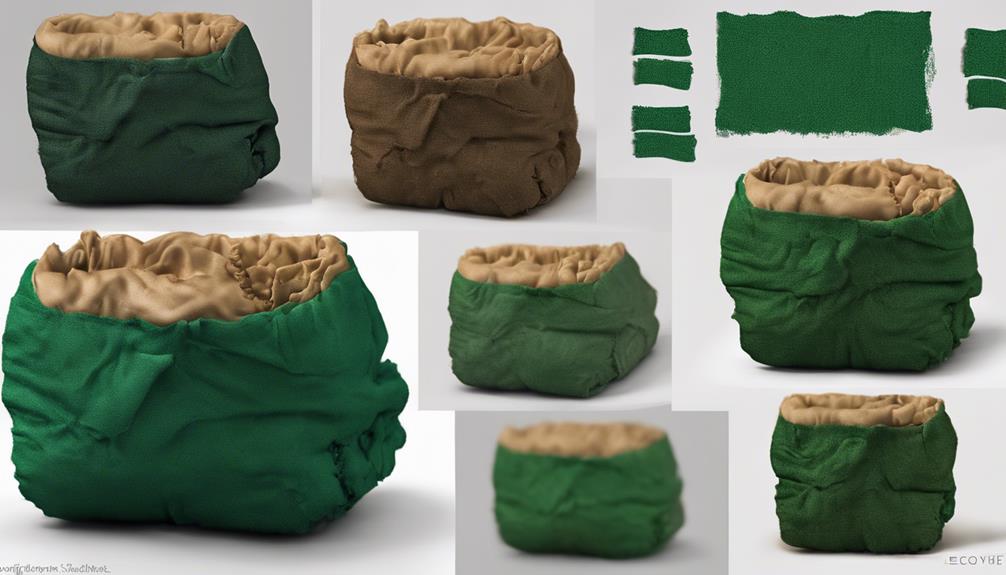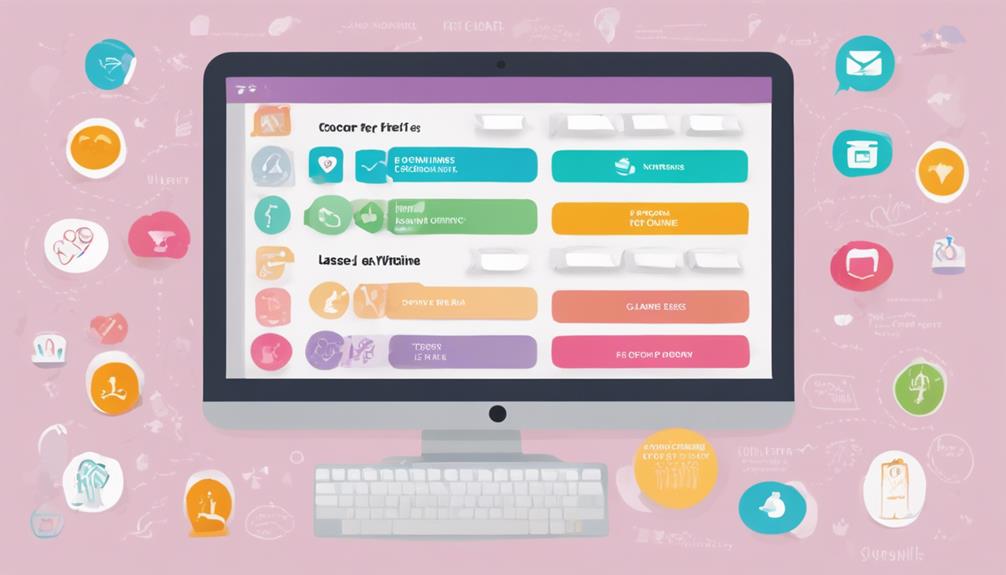As parents, it can be concerning when our newborns encounter digestive issues. Did you realize that up to 25% of infants experience constipation within their first few months of life?
Finding ways to assist our little ones in finding relief from this discomfort can be a priority for many caregivers. So, what steps can we take to ease our baby's discomfort and guarantee their digestive health?
Key Takeaways
- Monitor diaper output and feeding habits to track and promote regular bowel movements.
- Offer water and fiber-rich foods like puréed prunes for relief.
- Watch for signs of discomfort, hard stools, or blood in stool.
- Seek medical advice for persistent constipation or unusual symptoms.

Frida Baby Windi Gas Passer, Baby Gas Relief, Made in USA, 100% Natural, Safe & Effective Instant Relief for Babies & Infants, 10ct
INSTANT BABY GAS RELIEF: Say goodbye to gassy grimaces with our ingenious hollow tube that works like magic…
As an affiliate, we earn on qualifying purchases.
As an affiliate, we earn on qualifying purchases.
Understanding Newborn Constipation
Understanding newborn constipation can be challenging for parents, especially when it manifests through signs like hard, dry, or pellet-like stools and frequent straining during bowel movements. In breastfed babies, constipation is less common due to the easily digestible nature of breast milk. However, when solid foods are introduced, it can lead to changes in bowel movements, potentially causing constipation in infants. Formula-fed babies may experience constipation more frequently, as formula can sometimes be harder for babies to digest compared to breast milk.
When faced with constipation in a newborn, it's essential to take into account underlying health issues that could be contributing to the problem. Keeping track of bowel movements, noting any changes in consistency, frequency, or color, can provide valuable information for healthcare providers. Remedies for newborn constipation can include adjusting feeding habits, offering fruit juice, ensuring proper hydration, and introducing high-fiber foods if the baby is ready. If issues persist, consulting a pediatrician is important to address any potential concerns promptly.

Culturelle Baby Digestive Calm & Comfort Probiotic (Age 0-12 Mos) 8.5Ml, Helps Periodic Colic, Gas, Fussiness, Crying & Digestive Upset In Infants & Newborns, Vegan Non-Gmo Gluten-Free, 1 Mos. Supply
FROM THE #1 PEDIATRICIAN RECOMMENDED PROBIOTIC BRAND⟐: Build a strong foundation for infants with Culturelle Baby Digestive Calm…
As an affiliate, we earn on qualifying purchases.
As an affiliate, we earn on qualifying purchases.
Causes of Infant Constipation

When considering the causes of infant constipation, it is important to recognize the various factors that can contribute to this common issue in babies. Different feeding methods, such as breastfeeding and formula feeding, can impact a baby's bowel movements. While formula-fed babies typically have bowel movements every 1-2 days, breastfed infants may go up to a week without a bowel movement. Inadequate breast milk intake could lead to constipation in breastfed babies. Signs of constipation in infants include straining during bowel movements. It is important to note that the presence of blood in the stool may indicate an infection and requires immediate medical attention. Additionally, issues such as infant diarrhea and gas can also contribute to constipation. If you notice persistent constipation or concerning symptoms, a consultation with a pediatrician is recommended.
| Causes of Infant Constipation | |
|---|---|
| Breastfed Baby | Formula-Fed Baby |
| Infrequent Bowel Movements | Inadequate Breast Milk Intake |
| Straining During Bowel Movements | Signs of Constipation |
| Blood in Stool | Infant Diarrhea |
| Infant Gas | Pediatrician Consultation |

Zarbee’s Children’s Regularity Support Prebiotic Fiber Powder, Flavorless, Sugar Free, Gluten-Free, Daily Fiber Supplement for Kids & Toddlers 1 to 12 Years, 5.82 oz
Flavorless prebiotic fiber: Zarbee's Sunfiber powder delivers 6g fiber per serving, equivalent to 1 cup of cooked broccoli,…
As an affiliate, we earn on qualifying purchases.
As an affiliate, we earn on qualifying purchases.
Effective Home Remedies for Relief
To alleviate infant constipation effectively at home, incorporating simple remedies can bring relief and comfort to your little one. Here are some practical tips to help your newborn with constipation:
- Offer Water: If your baby is over 6 months old, offering a small amount of water can help soften stools and ease constipation.
- Feed Fiber-Rich Foods: Introducing fiber-rich foods like puréed prunes, sweet potatoes, or fruits into your baby's diet can aid in relieving constipation.
- Try Gentle Exercises: Performing gentle baby exercises like moving their legs in a bicycle motion can help stimulate bowel movements.
Additionally, massaging your baby's stomach or giving them a warm bath can provide relief from constipation. Remember, consulting your doctor before considering the use of infant glycerin suppositories for constipation relief is crucial. These simple home remedies can often bring relief to your little one without the need for medical intervention.

Quality Choice Infants Glycerin Suppositories Laxative Relief 25 Ct Each (2 Pack)
As an affiliate, we earn on qualifying purchases.
As an affiliate, we earn on qualifying purchases.
When to Seek Medical Advice

If your newborn is experiencing persistent discomfort or unusual symptoms related to bowel movements, it's important to promptly seek medical advice from a healthcare provider.
When it comes to poop troubles in your baby, knowing when to reach out for help is essential. If your little one hasn't passed meconium within the first 48 hours after birth, that's a red flag. Keep an eye out for signs like pain, hard or dry stools, or visible struggles during bowel movements.
Should your newborn seem uncomfortable, irritable, have a bloated belly, vomit, or show any traces of blood in their stool, contacting your pediatrician is the way to go. Consistent straining, a swollen belly, arching of the back, or excessive fussiness are also indicators that medical attention is necessary.
Preventing Constipation in Newborns
To prevent constipation in newborns, it's important to introduce high-fiber foods gradually when starting solids. As parents, we comprehend the worry that comes with seeing our little ones uncomfortable. Here are some tips to help keep your newborn's bowel movements regular and prevent constipation:
- Monitor Diaper Output: Keeping an eye on your baby's diaper output can give you valuable insights into their bowel movements. It's crucial to track this to make sure they aren't becoming constipated.
- Encourage Regular Feeding: Establishing a consistent feeding schedule can help promote regular bowel movements in newborns, reducing the chances of constipation.
- Offer Fruit Juice: Depending on your baby's age, offering a small amount of fruit juice can help stimulate bowel movements. However, always consult with your pediatrician before introducing any new foods or liquids to your baby's diet.
Frequently Asked Questions
How Do You Help a Newborn That Hasn't Pooped?
When a newborn hasn't pooped, we recommend offering a bit of water and gently massaging their tummy to stimulate bowel movements. It's important to consult a pediatrician before trying home remedies and track feeding patterns for changes.
How Do I Stimulate My Baby to Poop With Q Tips?
We gently stimulate our baby's anus with a lubricated Q-tip to trigger a bowel movement. A small amount of lubricant prevents discomfort. We insert the Q-tip gently, rotating slightly. Always consult a pediatrician for persistent issues.
What Position Helps Baby Poop?
We've found that gently massaging the baby's belly in a clockwise motion, encouraging the 'bicycle' leg motion, and holding them in a squatting position can help promote bowel movements. These techniques aim to ease your little one's discomfort.
How Do You Exercise a Newborn to Poop?
When trying to help a newborn poop, we gently move their legs in a bicycle motion, walk them in our lap, massage their stomach clockwise, and give them a warm bath. Always consult a pediatrician first.
Conclusion
As we navigate the challenges of newborn constipation, remember that knowledge is power. Stay vigilant in monitoring your baby's bowel movements and trying effective home remedies.
But, if concerns persist, don't hesitate to seek medical advice. By being proactive and informed, we can make sure our little ones find relief and comfort.
The journey to finding solutions may have its twists and turns, but with patience and persistence, we'll ultimately discover the right path to help our baby thrive.









